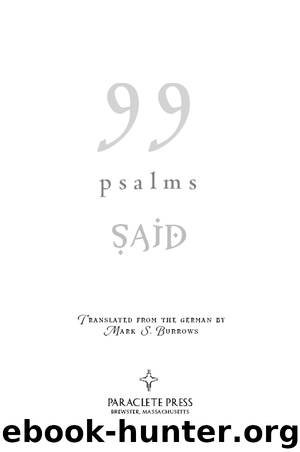99 Psalms by SAID

Author:SAID
Language: eng
Format: epub
Publisher: Paraclete Press
Notes on the Psalms
[3] These are historical allusions to places that witnessed the horrors of human violence during the twentieth century; see my comment about this poem in the afterword, p. 130–31.
[11] The mention of Moloch (or Molech) refers to an Ammonite god widely worshiped in the ancient Mediterranean world, and often associated with child sacrifice; thus one finds this warning in Leviticus 18:21: “You shall not give any of your offspring to sacrifice them to Molech, and so profane the name of your God: I am the LORD.” It also occurs in later literature, coming to stand as an extreme embodiment of evil; Milton berates the destructive power of Moloch in Paradise Lost (1667), as does Alan Ginsberg in his celebrated poem “Howl” (1955), where the reference points to an array of urban degradations and the cruel excesses of capitalism. SAID's usage echoes the latter.
[16] SAID's reference to “word” here has the force of the “lord's” way of communicating; thus, he seems to be advising God to take care with the use of language—that is, to consider how such language might be received.
[24] The reference to “enemies” who have “devour[ed]” the psalmist is reminiscent of the dereliction the Hebrew psalmist laments in Ps. 22, with cries for help against the ravaging dogs, the hungry lion, and wild oxen.
[31] The image is reminiscent of the Passover Seder, the meal commemorating the delivery from slavery in Egypt; during that meal, a place is traditionally set at the table and the door to the room left ajar as a reminder of the hope for Elijah's return.
[51] The psalmist here envisions himself in the role Muhammad occupies in Islam as the “messenger” of Allah. Here, however, he seems to be the bearer of the message as well as its interpreter.
[95] This is the single reference to a biblical story, one that is also found in slightly different form in the Qur'an; see Genesis 4 and Qur'an 5:27ff. In SAID's retelling of this story, however, Abel is still alive and has become an instrument of what SAID refers to as the staat, which literally means the nation; I have chosen to translate this word as “establishment,” a word that first emerged in English during the antigovernment student protest movement in the 1960s and 1970s. SAID's reference, of course, is broader than this, suggesting the state's imposition of power in ways that deny basic freedoms and violate human rights.
Download
This site does not store any files on its server. We only index and link to content provided by other sites. Please contact the content providers to delete copyright contents if any and email us, we'll remove relevant links or contents immediately.
Twelve Days of Christmas by Debbie Macomber(3024)
The Kiss of Deception by Mary E. Pearson(2386)
ESV Study Bible by Crossway(2106)
Waking Up by Sam Harris(1959)
7-14 Days by Noah Waters(1735)
Holy Bible (NIV) by Zondervan(1716)
The Harvest: Taken by M.A. Church(1577)
21 (The List Series) by Rhonda James(1487)
The King James Study Bible by Thomas Nelson(1473)
Warrior of the Light by Paulo Coelho(1247)
King of Kings by Unknown(1233)
Savage (Apex Predator Book 2) by David Meyer(1215)
My Daily Catholic Bible, NABRE by Thigpen Edited by Dr. Paul(1209)
Bound by You(1190)
The Falls by Unknown(1142)
The Holy Bible by King James Version(1111)
Good with Words by Patrick Barry(1096)
Proverbs by Zondervan(1094)
Agradecimientos by(1085)
